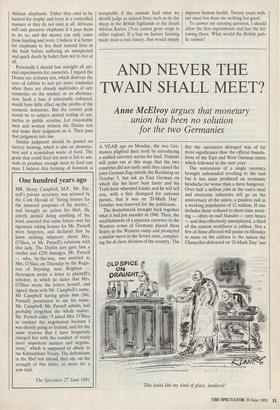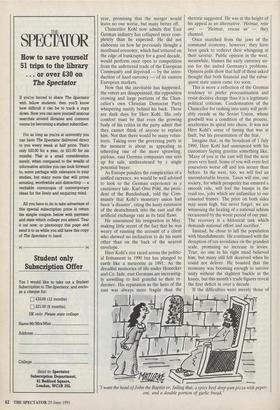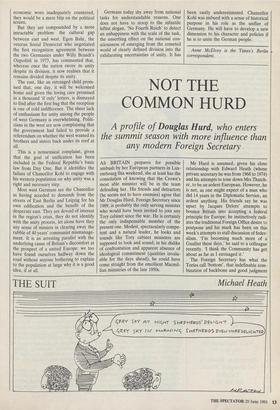AND NEVER THE TWAIN SHALL MEET?
Anne McElvoy argues that monetary
union has been no solution for the two Germanies
A YEAR ago on Monday, the two Ger- manies plighted their troth by introducing a unified currency across the land. Pedants will point out at this stage that the two countries did not unify until they raised the joint German flag outside the Reichstag on , October 3, but ask an East German on which day his heart beat faster and his Trabi horn whooped louder and he will tell you, with a fine disregard for national pieties, that it was on 'D-Mark Day'. October was reserved for the politicians.
The deutschmark brought back together what it had put asunder in 1948. Then, the establishment of a separate currency in the Western zones of Germany placed them firmly in the Western camp and prompted a similar move in the Soviet zone, complet- ing the de facto division of the country. The day the currencies diverged was of far more significance than the official founda- tions of the East and West German states which followed in the next year.
The restoration of a single currency brought unbounded revelling to the east but it has since produced an economic headache far worse than a mere hangover. Over half a million jobs in the east's steel and electronic industries will go on the anniversary of the union, a positive cull in a working population of 12 million. If one includes those reduced to short-time work- ing — often on null Stunden — zero hours — and thus effectively unemployed, a third of the eastern workforce is jobless. Not a few of those affected will pause on Monday to muse on the address to the nation the Chancellor delivered on 'D-Mark Day' last 'This looks like my kind of place, landlord!' year, promising that the merger would leave no one worse, but many better off.
Chancellor Kohl now admits that East German industry has collapsed more com- pletely than he expected. He did not elaborate on how he previously thought a moribund economy, which had tottered on the edge of bankruptcy for a good decade, would perform once open to competition from the unfettered trade of the European Community and deprived — by the intro- duction of hard currency — of its eastern European markets.
Now that the inevitable has happened, the voters are disappointed, the opposition crowing and large portions of the Chan- cellor's own Christian Democrat Party whispering nastily behind his back. These are dark days for Herr Kohl. His only comfort must be that even the growing body of his critics in the party admit that they cannot think of anyone to replace him. Not that there would be many volun- teers. Taking over the governing party at the moment is about as appealing as inheriting one of the more sprawling, parlous, east German companies one sees up for sale, unthreatened by a single potential buyer.
As Europe ponders the complexities of a unified currency, we would be well advised to look to the German experience as a cautionary tale. Karl Otto POhl, the presi- dent of the Bundesbank, told the Com- munity that Kohl's monetary union had been 'a disaster', citing the hasty extension of the deutschmark into the east and the artificial exchange rate as its fatal flaws.
He announced his resignation in May, making little secret of the fact that he was weary of running the account of a client who showed no inclination to do his sums other than on the back of the nearest envelope.
Herr Kohl's star raced across the politic- al firmament in 1990 but has plunged to earth like a meteorite in 1991. As the dreadful memories of life under Honecker and Co. fade, east Germans are increasing- ly unwilling to feel grateful to their re- deemer. His reputation as the hero of the east was always more fragile than the rhetoric suggested. He was at the height of his appeal as an alternative. 'Helmut, rette uns' — 'Helmut, rescue us' — they chanted.
Once snatched from the jaws of the command economy, however, they have been quick to redirect their whingeing at their saviour. Public opinion in the west, meanwhile, blames the early currency un- ion for the united Germany's problems. Opinion polls show that half of those asked thought that both financial and the subse- quent state union came too soon.
This is more a reflection of the German tendency to prefer procrastination and resist decisive change than it is a legitimate political criticism. Condemnation of the Chancellor for rushing into unity will prob- ably recede as the Soviet Union, whose goodwill was a condition of the process, accelerates its spiral into chaos. It was not Herr Kohl's sense of timing that was at fault, but his presentation of the feat.
Imagine that, in the broadcast of 1 July 1990, Herr Kohl had announced with his customary lisping gravitas something like, `Many of you in the east will find the next years very hard. Some of you will even feel yourselves worse off and less secure than before. In the west, too, we will feel an uncomfortable breeze. Taxes will rise, our society, for which prosperity has ensured a smooth ride, will feel the bumps in the road too, jolts which are unfamiliar to our cosseted frames. The price on both sides may seem high, but never forget, we are witnessing the healing of a national schism occasioned by the worst period of our past. The recovery is a historical task which demands national effort and sacrifice.'
Instead, he chose to lull the population with blandishments. He continued with the deception of tax-avoidance on the grandest scale, promising no increase in levies. True, no one in his right mind believed him, but many still felt deceived when he could not deliver. He boasted that the economy was booming enough to survive unity without the slightest buckle at the knees, but this month's trade figures reveal the first deficit in over a decade.
If the difficulties were merely those of want the head of John the Baptist or, failing that, a spicy beef deep-pan pizza with peper- oni, and a double portion of garlic bread.'
economic woes inadequately countered, they would be a mere blip on the political screen.
But they are compounded by a more intractable problem: the cultural gap between east and west. Egon Bahr, the veteran Social Democrat who negotiated the first recognition agreement between the two Germanies under Willy Brandt's Ostpolitik in 1973, has commented that, whereas once the nation swore its unity despite its division, it now realises that it remains divided despite its unity.
The east, like an estranged child prom- ised that, one day, it will be welcomed home and given the loving care promised in a thousand 'if only' letters, is dismayed to find after the first hug that the reception is one of cold indifference. The sheer lack of enthusiasm for unity among the people of west Germany is overwhelming. Politi- cians in the west are now complaining that the government had failed to provide a referendum on whether the west wanted its brothers and sisters back under its roof at all.
This is a nonsensical complaint, given that the goal of unification has been included in the Federal Republic's basic law from Day One. But it identifies the failure of Chancellor Kohl to engage with his western population on why unity was a right and necessary step.
Most west Germans see the Chancellor as having acceded to demands from the streets of East Berlin and Leipzig for his own edification and the benefit of the desperate east. They are devoid of interest in the region's crisis, they do not identify with the unity process, let alone have they any sense of mission in clearing away the rubble of 40 years' communist mismanage- ment. It is an arresting parallel with the underlying cause of Britain's discomfort at the prospect of a united Europe: we too have found ourselves halfway down the road without anyone bothering to explain to the population at large why it is a good idea, if at all. Germans today shy away from national tasks for understandable reasons. One does not have to stoop to the infantile leftist slogan, 'No Fourth Reich' to detect an unhappiness with the scale of the task, the unsettling effect on the national con- sciousness of emerging from the cosseted world of clearly defined division into the exhilarating uncertainties of unity. It has been vastly underestimated. Chancellor Kohl was imbued with a sense of historical purpose in his role as the unifier of Germany. He will have to develop a new dimension to his character and policies if he is to unite the German people.
Anne McElvoy is the Times's Berlin correspondent.




















































 Previous page
Previous page